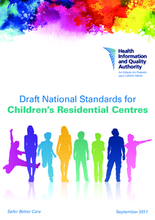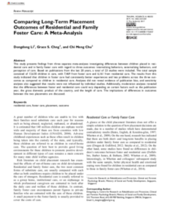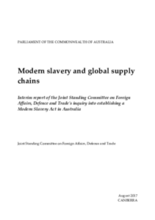Displaying 811 - 820 of 1510
Ireland's Health Information and Standards Directorate has launched a public consultation on the Draft National Standards on Children's Residential Care. Once finalized, the Standards will provide a framework for the ongoing development of child-centred and effective services for children living in residential care centres. This document contains the preceding Draft Standards, eligible for feedback through 02 November 2017.
This article studies the causal factors behind the major overhaul of Russia’s system for children in substitute care that has been taking place since the late 2000’s.
This article examines how Russian SOS Villages are undergoing foster reform, which prescribes a transition from institutional care for children deprived of parental care to family care model.
This paper addresses the challenges and benefits of involving biological parents in group homes in Israel and presents various means to encourage their involvement in care.
This study presents findings from three separate meta-analyses investigating differences between children placed in residential care and in family foster care with regard to three outcomes: internalizing behaviors, externalizing behaviors, and perception of care.
This report reviews the existing literature on the impact of child sexual abuse within various types of institutional care settings around the world.
This document includes the general comments adopted by the United Nations Committee on the Rights of Persons with Disabilities on Article 19 of the Convention: the right to live independently and being included in the community.
This paper reports the findings from a study investigating the priorities of care-leavers who arrived in England or Sweden as unaccompanied minors.
This interim report from the Parliament of Australia's Joint Standing Committee on Foreign Affairs, Defence and Trade presents its recommendations on the adoption of a Modern Slavery Act in Australia, with consideration to the trafficking, forced labor and child exploitation through orphanage tourism.
On 17 August 2017, the Australian Foreign Affairs and Aid Sub-Committee was briefed by representatives from the Cambodian Children’s Trust and Forget Me Not Foundation on the issue of orphanage tourism. This link includes a video of the opening statements from this briefing.






